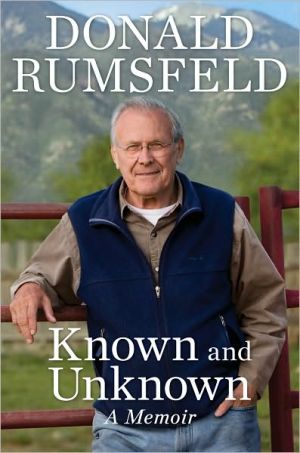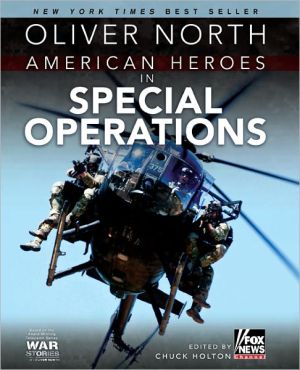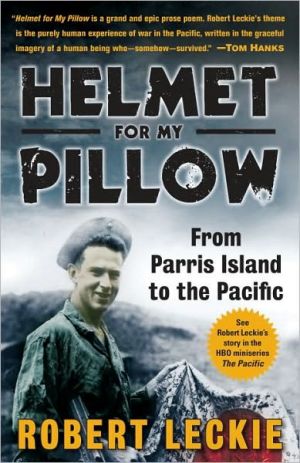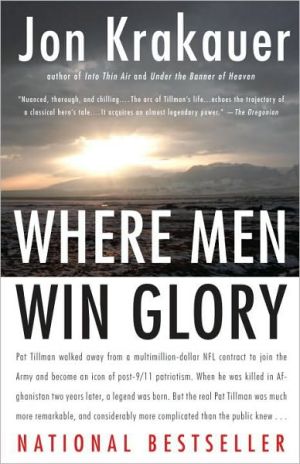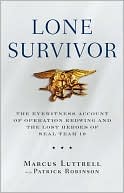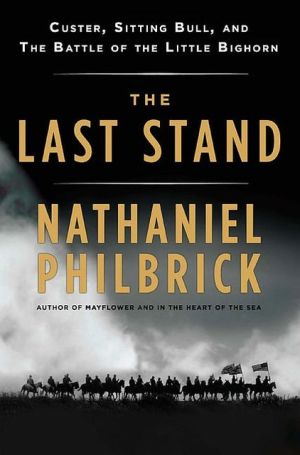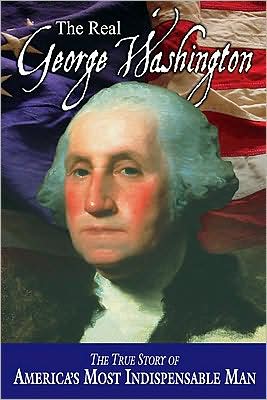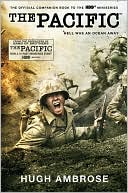Known and Unknown: A Memoir
Visit www.rumsfeld.com for more.\ Discover the enhanced e-book edition of Known and Unknown offering an unprecedented reading experience for a memoir by a major public figure. For web-connected readers, it features more than 500 links to never-before-available original documents from Donald Rumsfeld's extensive personal archive. It includes State Department cables, correspondence, and memoranda on topics such as Vietnam, Watergate, the days following 9/11, the wars in Iraq and Afghanistan,...
Search in google:
Like Donald Rumsfeld, "Known and Unknown" pulls no punches. With the same directness that defined his career in public service, Rumsfeld's memoir is filled with previously undisclosed details and insights about the Bush administration, 9/11, and the wars in Afghanistan and Iraq. It also features Rumsfeld's unique and often surprising observations on eight decades of history: his experiences growing up during the Depression and World War II, his time as a Naval aviator; his service in Congress starting at age 30; his cabinet level positions in the Nixon and Ford White Houses; his assignments in the Reagan administration; and his years as a successful business executive in the private sector. Rumsfeld addresses the challenges and controversies of his illustrious career, from the unseating of the entrenched House Republican leader in 1965, to helping the Ford administration steer the country away from Watergate and Vietnam, to bruising battles over transforming the military for the 21st century, to the war in Iraq, to confronting abuse at Abu Ghraib and allegations of torture at Guantanamo Bay. Along the way, he offers his plainspoken, first-hand views and often humorous and surprising anecdotes about some of the world's best known figures, from Margaret Thatcher to Saddam Hussein, from Henry Kissinger to Colin Powell, from Elvis Presley to Dick Cheney, and each American president from Dwight D. Eisenhower to George W. Bush. Rumsfeld relies not only on his memory but also on previously unreleased and recently declassified documents. Thousands of pages of documents not yet seen by the public will be made available on an accompanying website. "Known and Unknown" delivers both a fascinating narrative for today's readers and an unprecedented resource for tomorrow's historians. Proceeds from the sales of "Known and Unknown" will go to the veterans charities supported by the Rumsfeld Foundation.
Chapter 14\ Unfinished Business\ I was still serving as White House chief of staff on April 29, 1975, when America’s long and vexing involvement in Vietnam came to a close. A few weeks earlier President Ford had implored the Democratic- controlled Congress to authorize aid to our ally, the beleaguered South Vietnamese. He and Kissinger hoped the funds could bolster the South enough so it could arrange some sort of a truce with the North Vietnamese. But the U.S. Congress had had enough of Vietnam.\ When Ford heard that Congress had rejected his request, he was furious. “Those bastards,” he snapped. An evacuation of all of our forces was now inevitable.\ Vietnam was the first war in our history that the American people were able to watch unfold on television. That fact made a big difference. As such, we were all witnesses to the heartbreaking scene of U.S. forces executing a humiliating exit while our Vietnamese allies of more than a decade of war faced an uncertain future at the hands of the triumphant Viet Cong and North Vietnamese.\ Throughout that long, sad day, I was with President Ford at the White House as he monitored the withdrawal. The American ambassador to Vietnam, Graham Martin, updated us on the number of Americans still waiting to evacuate, as well as the number of Vietnamese clamoring to leave. The second number kept growing.\ Many of the Vietnamese who had worked with our forces were understandably desperate to flee from the advancing Northern forces, making use of rafts, small boats, whatever they could find to escape. When our Marines temporarily opened the gates to the embassy in Saigon, thousands of local citizens tried to force their way in, only to be physically pushed back. Martin and his team understandably found it difficult to turn our Vietnamese allies away.\ As Martin’s wife departed by helicopter, she reportedly abandoned her suitcase so that space could be made for one more South Vietnamese woman to squeeze onboard.\ Eventually it was decided that only American citizens could be airlifted in the short time remaining. The indelible image from that day is the heartbreaking photograph of desperate Vietnamese at a building across from the American embassy, trying to crowd aboard a helicopter departing from its roof. Those who had helped America during the war knew what was coming for them. It was an ignominious retreat for the world’s leading superpower.\ David Kennerly, the White House photographer who had earned a Pulitzer Prize for his Vietnam War photography and understood the power of images as well as anyone, put it succinctly to those of us gathered in the Oval Office with the President that day. “The good news is the war is over,” he said. “The bad news is we lost.”\ Secretary of State Kissinger believed that Ambassador Martin would be the last American to leave the country. After word was received that Martin had been airlifted out of the South Vietnamese capital, Kissinger announced to reporters,“Our ambassador has left, and the evacuation can be said to be completed.”\ As it turned out, that wasn’t quite true.\ After hearing Kissinger’s statement, Secretary of Defense Schlesinger advised us of the problem. The contingent of U.S. Marines assigned to prevent the panicking Vietnamese from flooding our embassy was still on the ground. Somehow there had been a misunderstanding. Kissinger and Schlesinger each considered the other’s department responsible for the miscommunication. The President felt Schlesinger bore responsibility and said he was “damn mad” about it. The last thing Ford needed was another public disagreement between his two top national security cabinet officials.\ I discussed the issue in the Oval Office with Ford, Kissinger, and Ron Nessen, the White House press secretary. A few in the room felt we should not issue a correction because the Marines were expected to be airlifted out soon, at which point Kissinger’s statement would be accurate. I disagreed. What if the Marines were overrun and unable to get out? In any event, what we had told the American people simply was not true. That mattered.\ “This war has been marked by so many lies and evasions,” I said, “that it is not right to have the war end with one last lie.”\ The President agreed. He sent Nessen down to the press room to issue a statement saying that the evacuation had not been completed after all.\ Kissinger was not pleased about the correction and again vented his anger at Schlesinger. He wanted the Defense Department to be blamed publicly for the miscommunication.* So the war in Vietnam ended in much the way it had been carried out—with recriminations and regret.\ Since my years in Congress, I had had concerns about our country’s involvement in Vietnam—to the point that both President Nixon and Kissinger viewed me as something of a dove on the subject. I hoped they would find a way to bring the war to an orderly close. It seemed to me that we had lost opportunities to actually win the war. During the Nixon administration, I supported the President’s and Defense Secretary Mel Laird’s policy of Vietnamization, which put the emphasis on enabling the Vietnamese to take charge of their own affairs. Even in the final days of the war, there was at least a possibility that we might have been able to salvage something worthwhile from the effort had Congress approved the resources to support the South Vietnamese government—and particularly to fund its army—for a longer period. But Congress was not ready to go against the strong antiwar sentiment in the country.\ With the war’s unfortunate end, a great many in our military and among the American people swore they would never again get involved in the tough, bloody business of counterinsurgency. Many wanted to turn inward, ignoring conflicts waged by the Soviet Union and its proxies. Instead of bringing us peace, I feared the chaotic conclusion of Vietnam could result in an even more deadly escalation of the broader Cold War struggle. The withdrawal from Vietnam became a symbol of American weakness—a weakness our adversaries would highlight for years—and an invitation to further aggression.\ Even after the pullout from Vietnam, President Ford pleaded with Congress to at least provide military aid to the anticommunists in the region so they could defend themselves. Those pleas, too, were rebuffed. As such, the victory of the Viet Cong was accompanied by the rise of Communist forces in neighboring Laos and Cambodia.\ * By the next day Kissinger had cooled down. After a meeting with the President, he said, “Don, I want you to know that I believe you handled the matter last night just right. . . . We would have ended up in a pissing match within the government, and we don’t need that.” He concluded saying, “I owed you that and wanted you to know it.” Kissinger could be a fierce bureaucratic battler, but he also was a man of integrity who would admit when he had erred.
Author's Note xiii\ Part I Lessons in Terror 1\ Chapter 1 Smiling Death 9\ Chapter 2 Into the Swamp 17\ Part II An American, Chicago Born 35\ Chapter 3 The Last of Spring 40\ Chapter 4 The Longest of Long Shots 53\ Part III The U.S. Congress: From Camelot to Quagmire 67\ Chapter 5 "Here, Sir, the People Govern" 74\ Chapter 6 Young Turks 91\ Part IV In Nixon's Arena 105\ Chapter 7 1968: Year of Turmoil 110\ Chapter 8 The Job That Couldn't Be Done 119\ Chapter 9 Counsellor 130\ Chapter 10 NATO and Nixon's Fall 147\ Part V Javelin Catcher: Inside the Ford White House 161\ Chapter 11 Restoring Trust 165\ Chapter 12 A Rocky Start 176\ Chapter 13 An Agonizing Reappraisal 192\ Part VI Fighting the Cold War 203\ Chapter 14 Unfinished Business 207\ Chapter 15 Turning On the Lights 213\ Chapter 16 Hold the SALT: Tension over Détente 222\ Chapter 17 The 1976 Defeat 233\ Part VII Back to Reality 241\ Chapter 18 Searle's Sweet Success 245\ Chapter 19 From Malaise to Morning in America 258\ Chapter 20 Our Rural Period, Interrupted 267\ Part VIII Leaning Forward 277\ Chapter 21 Here We Go Again 284\ Chapter 22 Dogs Don't Bark at Parked Cars 290\ Chapter 23 Bears in the Woods 305\ Chapter 24 The National Security Council 316\ Chapter 25 The Agony of Surprise 331\ Chapter 26 War President 349\ Part IX Into the Graveyard of Empires 363\ Chapter 27 Special Operations 367\ Chapter 28 Little Birds in a Nest 379\ Chapter 29 Kabul Falls, Karzai Rises 395\ Part X Saddam's Miscalculation 411\ Chapter 30 Out of the Box 416\ Chapter 31 The Case for Regime Change 425\ Chapter 32 A Failure of Diplomacy 443\ Chapter 33 Exit the Butcher of Baghdad 459\ Part XI The Occupation of Iraq 471\ Chapter 34 Catastrophic Success 479\ Chapter 35 Mission Accomplished? 493\ Chapter 36 Too Many Hands on the Steering Wheel 508\ Chapter 37 Liberation from the Occupation 524\ Part XII Wartime Detention 543\ Chapter 38 The Least Worst Place 554\ Chapter 39 The Twentieth Hijacker 574\ Chapter 40 Law in a Time of War 587\ Chapter 41 The Road Not Traveled 601\ Part XIII Pulling On Our Boots: Challenges and Controversies Beyond the War Zones 611\ Chapter 42 Katrina and the Challenge of New Institutions 616\ Chapter 43 Gardening 627\ Chapter 44 The Army We Had 645\ Part XIV The Long, Hard Slog 657\ Chapter 45 Hands Off the Bicycle Seat 661\ Chapter 46 The Dead Enders 671\ Chapter 47 Eyes on Afghanistan 681\ Chapter 48 Iraq's Summer of Violence 692\ Chapter 49 Farewells 704\ Chapter 50 After Tides and Hurricanes\ Acknowledgments 727\ List of Acronyms 731\ List of Illustrations 733\ Notes 739\ Index 793
\ Newsweek-The Daily Beast"The battle is joined. After a long silence, Donald Rumsfeld opened both barrels Tuesday, releasing his memoir, Known and Unknown . Early leaks of the book's defiant take on his life, times, and conduct of the Iraq War drew howls from some of the targets of his score-settling…But Rumsfeld battles on, taking his unapologetic account to the public."--( John Barry)\ \ \ \ \ Wall Street Journal"Readers might be appreciative to find themselves in possession of a serious memoir, more in keeping with the older Washington tradition of Dean Acheson or Henry Kissinger. As might the historians." --(Kimberly Strassel)\ \ \ Businessweek"Known and Unknown is a meaty, well-written book that will be a primary source for historians…this power memoir deserves to be read with the care that went into writing it." --(Christopher Buckley)\ \ \ \ \ Foreign Policy"The book places the reader in Rumsfeld's chair and is a serious stab at telling the history of a consequential period in America through the eyes of one of its most consequential players. It will be an important addition to the history of our time." --(Peter Baker (New York Times White House correspondent))\ \ \ \ \ Line of Departure"‘Dismissive' is a word often used to describe Rumsfeld, but ‘dismissive' perfectly describes his critics, who are unwilling or unable to re-examine their own assumptions in the light of new or overlooked information and fresh perspective provided by Rumsfeld, in his exceedingly well-documented work. With its hundreds of annotations and supplementary documents, Known and Unknown is a significant contribution to the historical record. It is, as Rumsfeld once noted about similar memoirs, ‘only from one perspective,' but it's a unique and valuable perspective, a serious work that deserves consideration by any serious student of recent history." --(Jamie McIntyre (former CNN Pentagon correspondent))\ \
